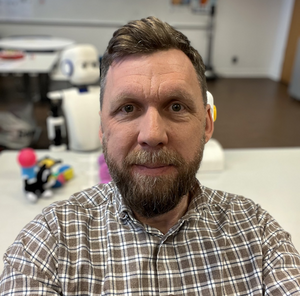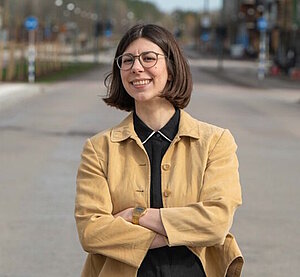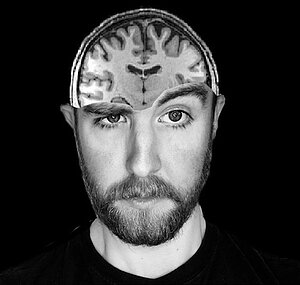Workshops
Exploring Human-Robot Interaction: A Wizard of Oz Workshop with Epi
Join an exclusive hands-on workshop where you'll get the chance to work with Epi, a humanoid robot, to learn how to conduct a Wizard of Oz experiment—a powerful research method where participants believe they’re interacting with an autonomous robot, while it’s actually controlled by a human behind the scenes.
During the workshop, you'll collaborate in small groups to operate Epi, culminating in your very own Wizard of Oz experiment. No technical background is required—the system is designed to be intuitive and accessible for everyone.
This event is organised by CRL-LU, an infrastructure in Lund that offers access to robotic platforms for experimental use.
Don’t miss this unique chance to explore whether robots could play a role in your next research project!
Keywords: Robot, Human-Robot Interaction, Wizard of Oz, Epi
Duration: 2 x 45 minutes
Maximum number of participants: 30

Instructors:
Birger Johansson is a cognitive science researcher at Lund University and the director of the Cognitive Robotics Lab (CRL-LU). His research focuses on cognitive modeling, and social robotics. Birger is also one of the lead developers behind Epi, a humanoid robot.
To sign up for the workshop fill out the form below:
Felt and Situated Ethics: Beyond Regulations, Approval and Consent
Ethics is often treated as an institutional process, including practices of following local regulations, applying for ethical approval, and handling consent forms. In this workshop, we want to move beyond the administrative side of ethics and create a space for reflecting on the contingencies and ethical dilemmas that researchers handle when, for example, conducting experiments with participants, studies with technology users or ethnographic fieldwork.
This workshop invites participants who are interested in reflecting on the lived experiences of research, navigating discomfort, and responding to unexpected contingencies. We want to stimulate discussion on how researchers balance the fine line between what is legal, what is ethical and what the situation requires, making situated decisions in ethically ambiguous situations.
The workshop will have two sessions, i) group discussion about own experiences of felt and situated ethics during the whole process from planning a study, data collection, storage, analysis, to presentation, and ii) zine making to reflect on these discussions, documenting own experiences and/or desired ethical scenarios.
Workshop participants will get the opportunity to contribute to a joint paper about felt ethics beyond consent.
Keywords: Felt ethics, Sensitivities, Contingency
Preliminary schedule:
Session 1
Introduction 15 min
Group discussions 30 min
Coffee break 30 min
Session 2
Introduction to zines 5 min
Zine making 50 min
Zine vernissage and wrap-up 20 min
Maximum number of participants: 20

Instructors:
Sofia Thunberg is a postdoctoral researcher at Chalmers University of Technology, conducting research in human-robot interaction. She has a PhD in cognitive science and has been a board member of the Swedish Cognitive Science Society since 2021. Sofia has extensive experience studying lived experiences of telepresence robots, as well as companion robots in sensitive contexts, such as care homes for older adults with dementia and specialised dental care for children with autism spectrum disorder. She has organised international workshops at RO-MAN2022, RO-MAN2023 and HAI2024.

Hannah Pelikan is an incoming assistant professor at Linköping University. She is a cognitive scientist and interaction technologist and holds a PhD in language and culture. Hannah is particularly interested in how researchers navigate situated ethics. She draws on her own experiences from videoethnographic studies of robots in a variety of settings, ranging from family homes to public roads. She has organized international workshops and courses at HRI2021, HRI2025 and CHI2022.
To sign up for the workshop fill out the form below:
Introducing DuckSoup: A platform to perform social interaction experiments online while manipulating participants’ voice and face
This workshop introduces DuckSoup, an experimental platform designed to study social cognition through real-time social interaction experiments. DuckSoup enables researchers to manipulate participants’ facial expressions and vocal features covertly during live video or audio interactions, allowing for causal investigation of social behavior in ecologically valid settings. Moreover, DuckSoup can be used to streamline the data collection of social interaction experiments, by enabling researchers to collect dozens of participants in parallel and in real time.
In the first session (45 minutes), we will present the capabilities of DuckSoup. To do this, we will present previous experiments performed with the platform. First, we will present two experiments where we aligned the smiles of participants in real-time with face transformation filters during speed dating and meet-up sessions, to investigate the causal effect of facial alignment on free conversations. Second, we will present an experiment where we manipulated the vocal masculinity of participants in real time during negotiations, which enabled us to investigate how vocal masculinity can bias group decision-making.
In the second session (45 minutes), we will demonstrate how to design and launch a simple social interaction experiment using DuckSoup. This includes setting up participant pairings, applying real-time manipulations, and recording synchronized audio-video datasets. If conditions allow, we will collect a dataset during the workshop with attendees.
This workshop is intended for cognitive scientists interested in moving beyond stimulus-response and correlational study paradigms of social interaction research, instead engaging with dynamic, interactive methods for studying social cognition, decision-making, and affective processes.
Keywords: Social cognition, social interactions, Voice/face transformations, Real-time experimental manipulation, Causal inference
Duration: 2 x 45 minutes
Maximum number of participants: No limit, participants can also attend online.

Instructors:
Daniel Zander is a Research Assistant at Lund University Cognitive Science, under the supervision of Pablo Arias-Sarah, Petter Johansson and Lars Hall. He is contributing to the development and research use of the DuckSoup platform. His current work explores how vocal dominance shapes influences decision-making in ecologically valid contexts. Daniel Zander holds a masters degree in cognitive science from Lund University.

Dr. Pablo Arias-Sarah is a Lecturer in social and cognitive neuroscience at University of Glasgow, whose work focuses on causal inference in naturalistic social interactions. He is one of the lead developers of DuckSoup and has used it to, among other things, study the impact of manipulated facial expressions on romantic attraction and behavioral synchronization. Dr. Arias-Sarah holds a PhD in cognitive science from Sorbonne University, a Master of Engineering in digital technologies and multimedia from Polytech' Nantes, and a Master of Science in acoustics, signal processing and computer science applied to sound, from IRCAM.

Dr. Petter Johansson is a senior lecturer and researcher in cognitive science at Lund University, where he also co-directs the Choice Blindness Lab. He holds a PhD in cognitive science from Lund University. Petter is well known for his work on choice blindness and social decision-making, and is involved in the theoretical development and application of the DuckSoup platform for studying real-time social influence.

Dr. Lars Hall is a researcher in Cognitive Science at Lund University, where he co-directs the Choice Blindness lab together with Petter Johansson. He earned his Ph.D. in Cognitive Science from Lund University. His research interests encompass areas such as intention, attitudes, emotion, decision making, semantics, auditory feedback, self-knowledge, and social interaction.
To sign up for the workshop fill out the form below:
Magic & Cognitive Science: Adapting Tricks for Research and Teaching
Performance Magic involves using practical knowledge of human cognition to induce illusory experiences in spectators for the purposes of entertainment. Contemporary researchers are increasingly coming to realize that magic methods represent a valuable toolkit for driving novel experimental research. In this workshop, Matt Tompkins will present an overview of how magic methods have been implemented in research across various domains of cognitive science: Including studies of attention, memory, reasoning, comparative cognition, and human robot interaction. Together, we’ll learn some basic magic techniques: How to ‘vanish’ a small object and how to read a spectator’s mind. Matt will also lead discussions focusing on practical ideas of how magic techniques and literature can be integrated into your own research methodologies, and how it can be used to enhance your teaching and science communication.
Preparing for the workshop:
- No prior experience performing magic is required! For the practical portions: Please bring along a deck of playing cards and a small object (like a coin) that you can conceal in your hand.
- Optional background readings will also be provided
Keywords: Magic, illusion, attention, memory, reasoning, comparative cognition, research methods, teaching, science communication
Duration: 2 x 45 minutes
Maximum number of participants: 30

Instructors:
Dr. Matt L Tompkins is a professional magician and a researcher in Lund’s Choice Blindness Lab. Previously, he obtained a DPhil in Experimental Psychology from the University of Oxford, where his thesis focused on the historical and contemporary relationships between magicians and academic researchers. In 2022, he was awarded first place in Sweden’s Forskar Grand Prixfor a presentation on how he uses magic to study illusory perceptions. These days, his main project involves designing and implementing fake mind control machines to study how people perceive and misperceive emerging tech.
To sign up for the workshop fill out the form below:
